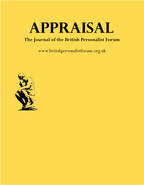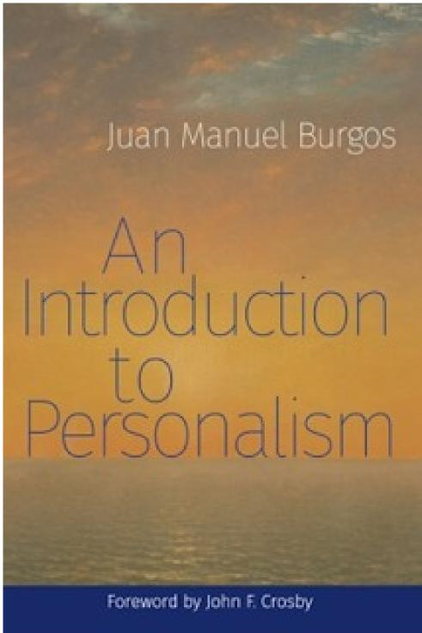|
|
Appraisal Vol. 11 No. 4, Spring 2018
|
Subject |
Object |
|
Value |
The ‘Metaphysical Subject’, at the subjective ‘limits of the world’. ‘The subject does not belong to the world: rather it is a limit of the world’ (5.633) Like the eye, it cannot see itself (but it makes seeing and knowing possible) This Self shows itself by its absence, as in the cogito. It is transcendental in this sense, not of the world. Value lies at this subjective limit of the pure Self. ‘The sense of the world must lie outside the world ... for all that happens and is the case is accidental’ (6.41) An expression of the Ideal or Transcendental Self. |
The Metaphysical Other, at the limits of logic, or language, in the form of the tautology and the contradiction. We don’t examine the world to discover that the first is necessarily true and the second necessarily false. They show themselves to be so. Note: Values (?) of both kinds, like these ‘limits’, also show themselves. It has nothing to do with the facts – these are accidental. But they lie beyond science and mere logic, so neither of these can capture it. We have, essentially, a kind of mysticism. An expression of the Ideal or Transcendental Other. Value is revealed when one does not want to change the facts and lives according to what is the case, then one ‘will see the world aright’ (6.54.) But ‘[w]hat we cannot speak about we must pass over in silence. |
Fact |
The ‘Factic’ Subject as a function of the world; the Psychological Self of conditioning. Its logical conclusion can be seen in Sartre’s Nausea, a horrific world and self of total determinism. Wittgenstein’s accidental, meaningless world, undistinguishable from the Factic Other. |
The Factic Other, into which the Factic Self must collapse, for this is the world as seen by materialism, which has no distinction between self and other: all is one material fact – and ‘accidental’. ‘In the world everything is as it is, and everything happens as it does happen: in it no value exists ...’ (6.41) |
realism. The self of solipsism shrinks to a point without extension, and there remains the reality coordinated with it.
Yet here we see that the collapse is general: the subjective flips into the object! In other words, within this subjectivist metaphysics, idealism (solipsism) collapses into its opposite – materialism, from its very start. This is hardly a basis for philosophy, but it’s been implicit for centuries in the West.
The Tractatus, like modernity when these implications are followed through, has no room for persons: it is an alien, personless terrain. Yet persons are not essentially thinkers; they are agents, as John Macmurray argued all those years ago. Thinking is a necessary aspect of a person, but it is not sufficient. Macmurray’s ‘form of the personal’ describes this:
For Macmurray persons are essentially constituted in relation to other persons, where care is vital and things are done. I argue in addition that there is a logical priority of ethical relations over thought and logic itself, and that this is an implication of Macmurray’s thought.
Macmurray challenges the notion that a self is essentially a thinker in his ‘form of the personal’, outlined above, which prioritises the person as agent over the self as thinker. This form shows that the agent is the ‘positive’ which makes sense of the thinker, the ‘negative’, which is necessary, but not sufficient. This form appears everywhere, e.g. in the notion of context, which makes sense of statements in isolation. In both cases the ‘negative’ enriches and aids the self as agent, but outside of selfhood in relation there is nothing to enrich.
This comes over in his ‘rhythm of withdrawal and return’. The person withdraws into thought when, a la Heidegger, there is a problem in action. (Of course theoretical physics and mathematics seem to be outside this: but they too have the whole context of their histories, which gives them sense and motivation). Yet s/he returns to test the thought in the context of the real world. The world can then be enriched and action honed.
I shall end with a brief illustration of this in the personal world. Eleven-month-old Jane has been loved and feels secure. All seems well. Then Mum says ‘Come on, Janey, let’s see if you can walk’ and places her on her feet. Jane panics: she feels love has been withdrawn. She thinks: ‘Mum hates me, I hate her etc’. But when she either walks or falls the love is returned and she discovers that her paranoid thoughts are false and that what goes on in her head is not necessarily true. In this way she can distinguish between fantasy and reality according to the benchmark of in her own experience. This is an example of weaning, which seems to me to continue throughout life, as thought withdraws and returns to check itself with what is the case.
Yet to me this suggests that the context must be governed by the ethical if meaning is to be possible. If Jane’s Mum neglects her, there is no real return, no real trust, no benchmark established. The scientist who fakes his results commits a sin against science’s Holy Ghost. For thought to work it must have trust (would ‘faith’ be too strong?) in a real world. The alternatives would seem to be the psychopathic ‘I must get the boot in first’, or schizoid collapse, as thought withdraws into mere logical possibility. This suggests to me that thought and logic, both, are logically dependent on the ethical. It is the person in relation that stops the realm of logical possibility from collapsing into itself – and puts it to work. The flip stops there!
Yet here we see that the collapse is general: the subjective flips into the object! In other words, within this subjectivist metaphysics, idealism (solipsism) collapses into its opposite – materialism, from its very start. This is hardly a basis for philosophy, but it’s been implicit for centuries in the West.
The Tractatus, like modernity when these implications are followed through, has no room for persons: it is an alien, personless terrain. Yet persons are not essentially thinkers; they are agents, as John Macmurray argued all those years ago. Thinking is a necessary aspect of a person, but it is not sufficient. Macmurray’s ‘form of the personal’ describes this:
- The self is agent and exists only as agent. The self is subject but cannot exist as subject...
- It can be subject only because it is agent...
- The self is subject in and for the self as agent...
- The self can be agent only by also being subject. (John Macmurray The Self as Agent, 100-102)
For Macmurray persons are essentially constituted in relation to other persons, where care is vital and things are done. I argue in addition that there is a logical priority of ethical relations over thought and logic itself, and that this is an implication of Macmurray’s thought.
Macmurray challenges the notion that a self is essentially a thinker in his ‘form of the personal’, outlined above, which prioritises the person as agent over the self as thinker. This form shows that the agent is the ‘positive’ which makes sense of the thinker, the ‘negative’, which is necessary, but not sufficient. This form appears everywhere, e.g. in the notion of context, which makes sense of statements in isolation. In both cases the ‘negative’ enriches and aids the self as agent, but outside of selfhood in relation there is nothing to enrich.
This comes over in his ‘rhythm of withdrawal and return’. The person withdraws into thought when, a la Heidegger, there is a problem in action. (Of course theoretical physics and mathematics seem to be outside this: but they too have the whole context of their histories, which gives them sense and motivation). Yet s/he returns to test the thought in the context of the real world. The world can then be enriched and action honed.
I shall end with a brief illustration of this in the personal world. Eleven-month-old Jane has been loved and feels secure. All seems well. Then Mum says ‘Come on, Janey, let’s see if you can walk’ and places her on her feet. Jane panics: she feels love has been withdrawn. She thinks: ‘Mum hates me, I hate her etc’. But when she either walks or falls the love is returned and she discovers that her paranoid thoughts are false and that what goes on in her head is not necessarily true. In this way she can distinguish between fantasy and reality according to the benchmark of in her own experience. This is an example of weaning, which seems to me to continue throughout life, as thought withdraws and returns to check itself with what is the case.
Yet to me this suggests that the context must be governed by the ethical if meaning is to be possible. If Jane’s Mum neglects her, there is no real return, no real trust, no benchmark established. The scientist who fakes his results commits a sin against science’s Holy Ghost. For thought to work it must have trust (would ‘faith’ be too strong?) in a real world. The alternatives would seem to be the psychopathic ‘I must get the boot in first’, or schizoid collapse, as thought withdraws into mere logical possibility. This suggests to me that thought and logic, both, are logically dependent on the ethical. It is the person in relation that stops the realm of logical possibility from collapsing into itself – and puts it to work. The flip stops there!
Bibliography
Wittgenstein, Ludwig
Cahoone, Lawrence
Macmurray, John
Strawson, P. F.
Sartre, Jean-Paul
Kierkegaard, Soren
- Tractatus Logico-Philosophicus, Routledge and Keegan Paul, 1961.
Cahoone, Lawrence
- The Dilemma of Modernity, SUNY, 1988.
Macmurray, John
- The Self as Agent, Faber & Faber, 1957.
- Persons in Relation Faber & Faber, 1961.
Strawson, P. F.
- ‘Self, Mind and Body’ in Freedom and Resentment and Other Essays, Methuen, 1974.
Sartre, Jean-Paul
- Nausea Penguin Books, 1965.
Kierkegaard, Soren
- ‘The Sickness Unto Death’ inFear and Trembling and The Sickness Unto Death Princeton UP, 1968.
Catholic University of America Press presents:
|
Through a revitalization of the concept of the person, an array of thinkers developed a philosophy both rooted in the best of the intellectual tradition and capable of dialoguing with contemporary concerns.
Our times are marked by numerous and often contradictory ideas about the human person. An Introduction to Personalism presents an engaging anthropological vision capable of taking the lead in the debate about the meaning of human existence and of winning hearts and minds for the cause of the dignity of every person in the 21st century and beyond.
Our times are marked by numerous and often contradictory ideas about the human person. An Introduction to Personalism presents an engaging anthropological vision capable of taking the lead in the debate about the meaning of human existence and of winning hearts and minds for the cause of the dignity of every person in the 21st century and beyond.
|
|
|
|
|
|


